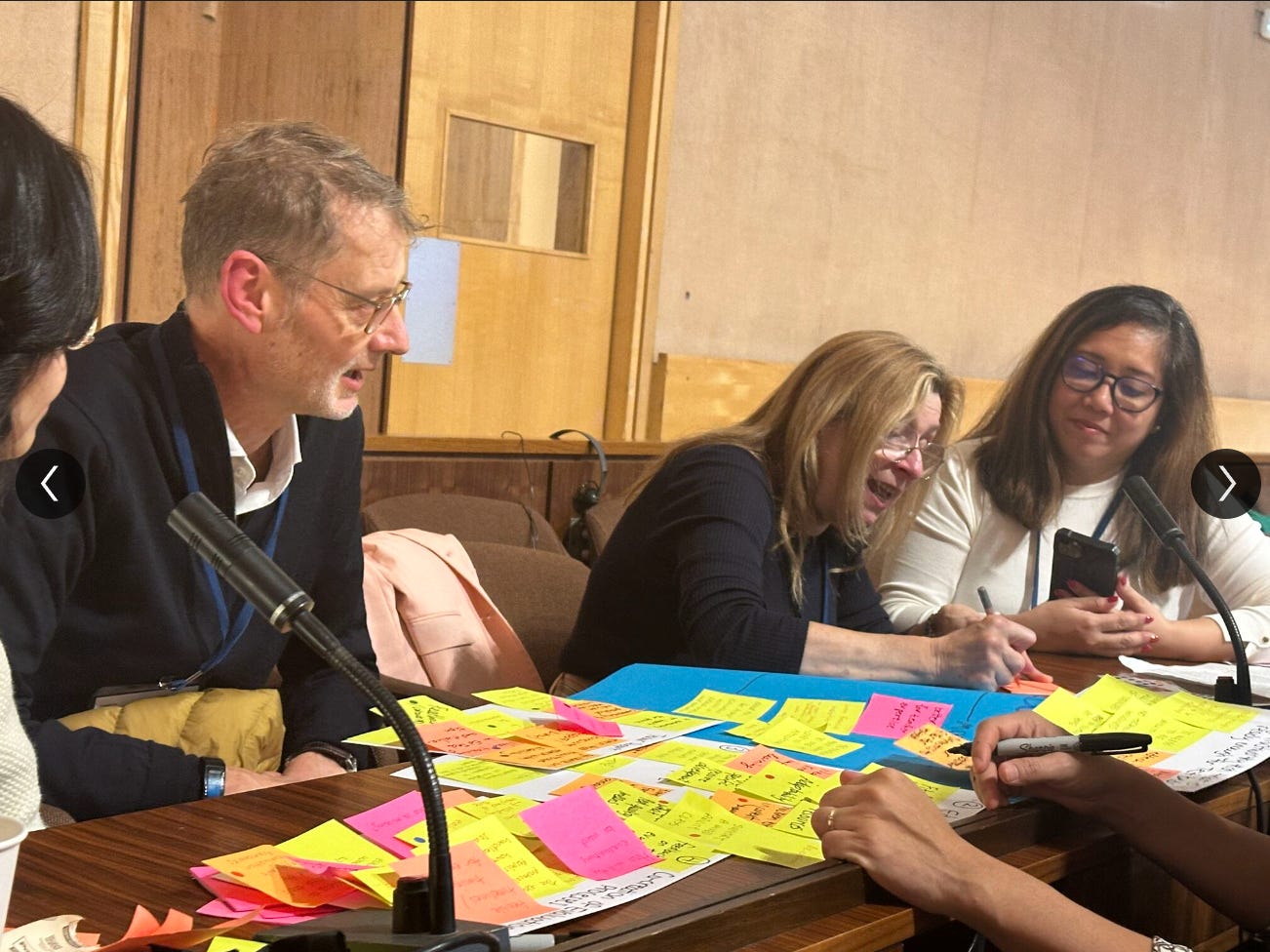Supporting SEND digitally
AI and SEND support, UNESCO edtech strategy lab, Genie 2, unicorns and dinosaurs, Excel (yes, really) and much more...
What’s happening
We’ve been thinking about digital and SEND a lot this week. Sarah will be speaking at the BETT Show with colleagues Jayne Franklin, former headteacher at Great Ormond Street Hospital School, and Peter Lillington, Camden Learning Centre manager.
Sarah, Jayne and Peter will present a case study showing how schools in the London borough of Camden are working together to develop a professional development programme for teachers and teaching assistants to share practice and explore the opportunities and pitfalls of using digital technologies and resources to support students with special educational needs and disabilities.
We’ll be talking about how to present digital information effectively, ways to quality assure online interventions and how AI can support pupils with SEND as well as teachers’ resource making and administration. And we will showcase real examples of how teachers are leveraging tools and techniques to support SEND learners in Camden classrooms.
Some of these themes were echoed in a webinar discussion about SEND and AI, coordinated by Rose Luckin. Colleagues with a range of special needs and disability expertise from schools, publishing, edtech and AI industries came together to explore the implications and opportunities of AI for students and teachers.
In the week that Martyn Oliver presented the 2023/24 Ofsted annual report and highlighted the 140% rise in applications for Education Health and Care Plans (EHCP) and the need for more special needs coordinators (SENCO), the group discussed the overloaded and underfunded SEN system in England.
Colleagues mentioned how AI can support parents and teachers in the process chain from diagnosis, documentation and identification of needs to providing impactful support.
While AI can undoubtedly support the arduous administrative process of creating an EHCP, school leaders identified the risk of AI creating even more generic EHCPs if models only draw on previous plans. There are also risks around using children’s personal data when using AI to help create EHCPs and interventions.
Educators shared examples of opportunities to create bespoke differentiated support and resources for the needs and interests of individual children and micro adaptations in busy classrooms.
Concerns were raised about current patchy SEND CPD for teachers and TAs, especially in relation to digital. This is one of the topics of our BETT talk: ways to rate or quality assure edtech tools, platforms and solutions.
AI and other digital solutions offer fresh and sometimes exciting potential for supporting pupils with SEND but it’s an area that needs careful navigation to avoid the hype surrounding some edtech products. It also requires teaching staff to be equipped and digitally confident to use technology in effective ways to support such a wide range of special needs and disabilities.
AI roundup
Possibly free AI CPD
In-person professional development focused on equipping educators to navigate the evolving landscape of AI in education is on the cards from Educate Ventures Research (Rose Luckin’s organisation) and the Good Future Foundation. Their goal is to collaborate with school leaders and teachers to build confidence in AI implementation, share best practices, and build a supportive network. We think it’s going to be free for non-fee-paying schools but it’s not entirely clear from the EVR newsletter. But there is a form to register interest.
Strategy is not shopping
Laura Knight explores how AI can drive operational efficiency – and it’s not about shopping for products
UNESCO edtech strategy lab, Paris
130 edtech leaders from over 20 countries (including our own fab colleague Peter Lillington) gathered at UNESCO's headquarters in Paris this week to explore insights from research into educational technology use, development and implementation as part of UNESCO’s Global Education Coalition and Digital Transformation Collaborative. Watch this space for their report which comes out next week.

Is generative AI hitting a wall?
Bryan Alexander has scanned the AI landscape at the end of 2024, looking at agents, AI in web search, video and audio tools and open source developments. He notes that timelines and quality are slipping for the latest iterations of the leading LLMs and suggests that it’s become increasingly difficult to find new, untapped sources of high-quality, human-made training data that can be used to build more advanced AI systems. He prophesises that:
“If true, it means that: AI firms will more aggressively go after human generated online content; they might pursue more partnerships with publishers and other intellectual property holders; financial capital might sour, as I’ve warned. Where does that pent-up investment of money, human talent, and energy go? I suspect it’ll push into robotics.”
Weather forecasting AI style
With Storm Darragh hitting this weekend, here’s one for geography and computing teachers to explore with their students. Google Deep Mind’s new GenCast AI model advances the prediction of weather uncertainties and risks, delivering faster, more accurate forecasts up to 15 days ahead.
Letting the genie out
And another launch from Deep Mind, Genie 2, can generate an interactive, real-time scene from a single image and text description (for example, “A cute humanoid robot in the woods”).
Quick links
The most popular mobile games in the UK are failing to advertise that they contain ‘loot boxes’, the random in-game purchases that critics say foster gambling habits in young people
A 50-member committee of experts in Spain is calling for children to have limited exposure to digital devices until they are 13 to mitigate what they see as a public health problem. It follows a similar government committee in France, which recommended in April that children should not be allowed to use smartphones until they are 13 and should be banned from accessing conventional social media such as TikTok and Instagram until they are 18
Pearson intends to offer on-screen assessments for its Edexcel GCSEs in History and Business Studies from 2027. The new plans could mean that candidates are able to take GCSEs in five subjects that account for a third of all GCSE entries, without using a pen or paper, within three years
One to share with students. At the London Careers Festival's Cultural and Creative Careers day, young people will be able to build a day of workshops to best suit their creative aims and interests including film, TV, music and theatre.
We’re reading, listening…
From Prospect: Unicorns and dinosaurs are everywhere! Why do these creatures so dominate the games and clothes we give our children? Fascinating look at the history behind the rise of unicorns and dinosaurs as gendered toys. Could be an interesting topic for media literacy and PSHE lessons.
From TedX via Fix the News: US educator Graeme Mitchell explores the idea that the news we consume shapes how we think and act. Concerned about how social media feeds were causing hopelessness among his students, he started a pioneering programme for fostering evidence-based optimism, dedicating half of all class time to showcasing stories of progress instead. He sets out the results in his 10-minute TedX talk.
From the TechShock podcast: Sonia Livingstone, professor at the London School of Economics and Director of the Digital Futures for Children Centre talks to Parent Zone’s Vicki Shotbolt in a nuanced conversation about how regulation can stay relevant in a world of generative AI and ‘innovation at speed’.
Give it a try
Excel is Fun
OK, this is an oldy but goody. Excel has been around for nearly 40 years and it's still one of the most powerful and useful software programmes. But how well do you and your students use it? We’ve seen this Excel is Fun YouTube channel recommended by a teacher – what do you think?
Connected Learning is by Sarah Horrocks and Michelle Pauli




